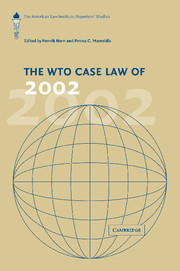Book contents
- Frontmatter
- Contents
- Foreword
- A note on the American Law Institute
- List of reporters
- 1 Introduction
- 2 United States – Section 129(c)(1) of the Uruguay Round Agreements Act (WTO Doc. WT/DS22/R of 15 July 2002): Beating Around (The) Bush
- 3 United States – Tax Treatment for “Foreign Sales Corporations” Recourse to Arbitration by the United States Under Article 22.6 of the DSU and Article 4.11 of the SCM Agreement (WT/DS106/ARB): A Comment
- 4 United States – Countervailing Duties on Certain Corrosion-Resistant Carbon Steel Flat Products from Germany (WTO Doc. WT/DS213/AB/R): The Sounds of Silence
- 5 United States – Countervailing Measures Concerning Certain Products from the European Communities (WTO Doc. WT/DS212/AB/R): Recurring Misunderstanding of Non-Recurring Subsidies
- 6 Canada – Export Credits and Loan Guarantees for Regional Aircraft (WT/DS222/R): A Comment
- 7 United States – Definitive Safeguard Measures on Imports of Circular Welded Carbon Quality Line Pipe From Korea
- 8 Chile – Price Band System and Safeguard Measures Relating to Certain Agricultural Products
- 9 India – Measures Affecting the Automotive Sector
- 10 United States – Section 211 Omnibus Appropriations Act of 1998 (WT/DS176/AB/R): A Comment
- 11 United States – Preliminary Determination with Respect to Certain Softwood Lumber from Canada: What is a Subsidy?
- 12 European Communities – Trade Description of Sardines: Textualism and its Discontent
- Index
- References
9 - India – Measures Affecting the Automotive Sector
Published online by Cambridge University Press: 06 July 2010
- Frontmatter
- Contents
- Foreword
- A note on the American Law Institute
- List of reporters
- 1 Introduction
- 2 United States – Section 129(c)(1) of the Uruguay Round Agreements Act (WTO Doc. WT/DS22/R of 15 July 2002): Beating Around (The) Bush
- 3 United States – Tax Treatment for “Foreign Sales Corporations” Recourse to Arbitration by the United States Under Article 22.6 of the DSU and Article 4.11 of the SCM Agreement (WT/DS106/ARB): A Comment
- 4 United States – Countervailing Duties on Certain Corrosion-Resistant Carbon Steel Flat Products from Germany (WTO Doc. WT/DS213/AB/R): The Sounds of Silence
- 5 United States – Countervailing Measures Concerning Certain Products from the European Communities (WTO Doc. WT/DS212/AB/R): Recurring Misunderstanding of Non-Recurring Subsidies
- 6 Canada – Export Credits and Loan Guarantees for Regional Aircraft (WT/DS222/R): A Comment
- 7 United States – Definitive Safeguard Measures on Imports of Circular Welded Carbon Quality Line Pipe From Korea
- 8 Chile – Price Band System and Safeguard Measures Relating to Certain Agricultural Products
- 9 India – Measures Affecting the Automotive Sector
- 10 United States – Section 211 Omnibus Appropriations Act of 1998 (WT/DS176/AB/R): A Comment
- 11 United States – Preliminary Determination with Respect to Certain Softwood Lumber from Canada: What is a Subsidy?
- 12 European Communities – Trade Description of Sardines: Textualism and its Discontent
- Index
- References
Summary
Introduction
This study addresses the disputes brought to the World Trade Organization (WTO) by the European Communities and the United States concerning certain Indian measures affecting the importation of automobiles and components in the form of “completely knocked down” (CKD) and “semi-knocked down” (SKD) kits. The measures in question originated during a time when India employed extensive import licensing requirements, ostensibly for balance of payments purposes. India's broad licensing regime was challenged in 1997 by the European Communities and the United States, resulting in a settlement with the European Communities and a ruling in favor of the United States pursuant to which India agreed to abolish its import licensing system. Some restrictions in the automotive sector remained, however, which became the subject of this proceeding.
The automotive restrictions resulted from a law known as Public Notice 60 (PN60), enacted in 1997, which provided that companies desiring to obtain import licenses for CKD or SKD kits must enter a contract with the government known as a “Memorandum of Understanding” (MOU). These MOUs, among other things, required companies to achieve stated local content percentages (“indigenization requirements”) in their manufacturing operations, and to ensure that the value of their exports was equal to the value of their imports (“trade balancing requirements”). The contractual commitments to the government through the MOUs remained binding and enforceable even after the import licensing regime that had given rise to them was abolished.
- Type
- Chapter
- Information
- The WTO Case Law of 2002The American Law Institute Reporters' Studies, pp. 158 - 178Publisher: Cambridge University PressPrint publication year: 2005

